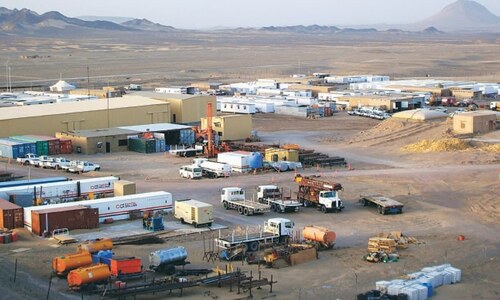CAUGHT between a rock and a hard place, the government has made a choice in the $11bn dispute with regard to the Reko Diq gold and copper project that some would applaud, and others criticise.
The final deal, signed with the Canadian mining giant Barrick Gold and its Chilean partner Antofagasta, for reviving the project and resolving the dispute, has been presented as the only way out of a situation which had negatively impacted Pakistan’s standing as an investment-friendly nation.
In fact, had the agreement been negotiated a little more meticulously, the authorities might also have secured commitments from Barrick to set up a refinery at Chagai to ensure transparency in what, and how much, will be mined and shipped out of the country.
Still, it is to be hoped that all parties involved — Barrick, the centre and Balochistan — will agree on a mechanism to dispel anxiety and ensure that no stakeholder — especially Balochistan’s people — is cheated out of their share when precious metals are taken out of the country in raw form.
That said, the new deal appears to be a big improvement on the past when international investors held 75pc of the total shareholding in the project that is billed to be potentially the world’s largest gold and copper mine, with deposits capable of producing 200,000 tons of copper and 250,000 ounces of gold a year for nearly 50 years.
Under the new agreement finalised after 10 years of legal battle, Barrick will get half of the project ownership, with Balochistan and three federal state-owned firms 25pc each of the remainder.
The agreement will help Pakistan avoid $11bn in fines ordered by the international arbitration court against its decision to deny the joint venture of Barrick and Antofagasta the licence to develop Reko Diq. Islamabad will, however, pay $900m to Antofagasta, which is exiting the project, to purchase its shareholding.
Although the Balochistan government is on board with Islamabad on the agreement, some Baloch nationalist parties like the BNP-M — and even the JUI-F — do not seem happy with it, and the way the government rushed the Foreign Investment (Promotion and Protection) Bill, 2022, through parliament to guarantee the protection of foreign investment in connection with Reko Diq to meet the Dec 15 deadline for signing it.
There’s no doubt that the reconstituted deal is mostly tilted in favour of the investor. But as they say a bird in hand is worth two in the bush; it’s time to move on and make the best use of the pact.
The project will bring significant growth opportunities to Balochistan by creating jobs, promoting the regional economy and increasing investment in healthcare, education, vocational training, food security and the supply of potable water.
It is, however, also time for our policymakers to build institutional capacities to craft international agreements to protect the interests of the country, and not the investors.
Published in Dawn, December 17th, 2022











































